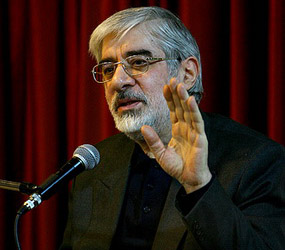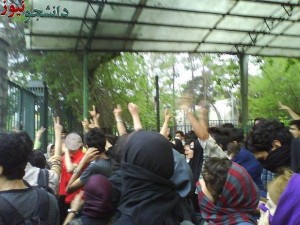
2115 GMT: Nuclear Twist (cont.).
According to Reuters, Turkish Foreign Minister Ahmet Davutoglu is saying Iran, Turkey, and Brazil have reached agreement on procedure for a uranium swap deal. Details will follow on Monday.
1930 GMT: Nuclear Twist. Reuters is following Turkish television in reporting that Turkish Prime Minister Recep Tayyip Erdogan, who on Friday had cancelled his trip to Tehran,
has reversed his decision and is now in Iran.
The move is a signal that the Iranian talks with Brazilian President Luiz Inacio Lula da Silva have put a deal on the table which involves Turkish mediation. Could there also be a role for Turkey as a broker in a uranium swap outside Iran?
NEW Iran Blackout: Shutting Down the Movies
Iran: Last Words of Executed Alamhouli “For God’s Sake, Let Me Hear My Mother’s Voice” (Ghazi)
The Latest from Iran (15 May): Executions, Detentions and a Cancellation
1835 GMT: Intimidation (cont.). In a letter to Sadegh Larijani, the head of Iran's judiciary,
175 members of Parliament have called for immediate action against opposition figures as "heads of sedition”.
In the letter, read out by conservative MP Hassan Ghafouri Fard in the Majlis, the legislators called for “accelerating” the investigation of complaints against Mir Hossein Mousavi and Mahdi Karroubi.
The MPs also state that the “heads of the sedition” have no regard for the judicial system in Iran and have attacked Karroubi and Mousavi for their recent remarks against the sudden and unjust execution of five political activists on charges of terrorism.
1630 GMT: The Brazil Dimension (cont.). The Associated Press has a different take on the Lula-Ahmadinejad talks from other reports (see `1600 GMT). While there was no reference to any discussions on uranium enrichment, there was
a defense of Iran's nuclear programme:
Brazilian President Luis Inacio Lula da Silva met with Iranian leaders on Sunday, and called the relationship between the two countries “strategic.”
Speaking in defense of Iran’s right to “independently navigate its course” to seek development and improvement, Silva stressed that a peaceful nuclear research program was within Iran’s sovereign rights.
1600 GMT: The Brazil Dimension. Iranian state media's presentation of today's meetings between President Ahmadinejad and Brazi's Luiz Inacio Lula da Silva has featured
the two leaders' talk of economic co-operation but said nothing about the nuclear issue. mbitions, an initial joint statement from the two leaders was silent on the subject.A joint statement focused on an increase of two-way trade.
Lula also said Brazil will finance 1 billion Euros of food exports to Iran over the next five years to make trade between the two countries less dependent on foreign banks.
1540 GMT: Sentencing Human Rights Activists (In Absentia). Iran
has sentenced award-winning women's rights activist Shadi Sadr and fellow activist Mahbubeh Abbas-Gholizadeh to jail and lashes over a protest in 2007.
The lawyer for the two women, Mohammad Mostafai, said Sadr was sentenced to six years in jail and 74 lashes for acting against national security and harming public order. Abbas-Gholizadeh received two-and-a-half years in jail and 30 lashes on similar charges.
(Read
Sadr's article, "Getting to the Point on Detentions and Human Rights",
her speech at the UN on abuse, justice, and human rights, or
her acceptance of the 2009 Human Rights Defenders Tulip award.)
Both women, who are now abroad, were arrested with 30 other protestors at a rally in March 2007 outside a Revolutionary Court where four fellow feminists were on trial.
1325 GMT: Political Prisoner Watch. More on
the arrest of Mohsen Armin, spokesman and senior member of the Mojahedin of Islamic Revolution party....
Armin's daughter said security officers, with a search warrant and arrest warrant, took away her father and confiscated his laptop, some documents, and identification cards. Iranian authorities tried to arrest Armin justafter the election and after the Ashura demonstration (27 December), but he was away from home on both occasions.
1200 GMT: Rafsanjani Watch. Hashemi Rafsanjani, former President and current head of the Expediency Council,
has condemned censorship and fabrication of facts, describing policies behind these actions as "futile."
Rafsanjani said that, in today’s world, “[We must] coordinate actions with human principles....We must create an open space and fall into step with the rest of the world.”
1110 GMT: Spin of the Week? A reader kindly alerts us to a reference in the Iranian media to the claimed strike in Kurdistan.
Tabnak insists that any news and pictures of empty streets in Kurdistan's cities were just foreign propaganda and claims that thousands of Kurds marched in support of the "Kurdish Leadership Conference".
1100 GMT: No Connection. Move Along. Iranian Foreign Ministry Spokesman Ramin Mehmanparast
has denied any link between Iran's released of French graduate student Clotilde Reiss, arrested last July, and a French court's acquittal of Iranian businessman Majid Kakavand on charges that he exported US military technology to Iran: "The two cases have absolutely no relation with each other."
1010 GMT: Political Prisoner Watch. Mohsen Armin, spokesman and senior member of the Mojahedin of Islamic Revolution party,
has been arrested.
0930 GMT: In the Universities.
Rah-e-Sabz carries a report claiming that
professors are now being appointed for their willingness to support the Government line rather than for their academic qualifications.
0900 GMT: Conservatives Defend the System (Against Hardliners). The interesting conflict between "Green Movement v. Government" continues with two statements within the establishment warning of "hardliner" challenges.
Mohammad Nabi Habibi, head of the Motalefeh Party has said, "
Our discord is like a red carpet for reformists." Majid Ansari of the Combatant Clergy Association argues that the
cooperation of "moderate hardliners" and reformists is not a current outside acceptable Iranian politics.
0855 GMT: Beating the Oil Squeeze? Whatever the outcome of Brazilian President Luiz Inacio Lula da Silva's visit to Tehran on the nuclear front, it looks like Iran
can claim a success over oil.
The head of Brazil's energy regulator, Haroldo Lima, has said that Lula and Iranian leaders are likely to sign a memorandum opening the way for Brazilian companies to participate in the modernization of Iran's oil sector: "We have equipment, the engineering and the parts for the oil sector that can help in their modernization."
Lima said that, in exchange, Iran could provide Brazil with drills to help in the exploration of deep-water oil: "In Brazil we have a great shortage of companies that have the capacity to do this exploration. They are making drills available."
0845 GMT: Intimidation (cont.). The
Resalat newspaper has continued the threat against Mousavi, fed by regime officials like Gholam-Hossein-Elham of the Guardian Council and Tehran Prosecutor General Abbas Jafari Dowlatabadi: the leaders of "fitna" (sedition) need to
feel the iron fist of the law.
0800 GMT: Challenge. Mohammad Hashemi, a member of the Expediency Council and brother of Hashemi Rafsanjani,
has declared that if the people do not want it, the Iranian system cannot exist.
0740 GMT: Film Corner. As director Jafar Panahi continues to sit in Evin Prison, we've posted
a feature on the latest warning by Iranian authorities to actors and filmmakers: don't cooperate with foreigners without permission.
0730 GMT: Economy Watch. Minister of Welfare and Social Security Sadegh Mahsouli has said that the
subsidy reduction plan will start this week in three Iranian provinces.
0715 GMT: That Dangerous Foreign Education. Mohammad Shahryari, a member of Parliament's National Security Committee, has confirmed that the
committee is reviewing the situation of 400 Iranian students at British universities.
The 400 are the children of Iranian officials. Karim Abedi, another committee member, had said on Friday, "The Ministry of Foreign Affairs has informed Iranian ambassadors abroad to take the actions necessary to prevent the children of Iranian officials from studying at foreign universities."
Shahryari said, "Though no final decision has been made on the return of these children to the country so far, it deems advisable for these people not to study at British universities."
0710 GMT: Speaking of Intimidation.... Member of Parliament Moussa Ghorbani, speaking with Fars News, claims that Sadegh Larijani, the head of Iran's judiciary, has said
authorities will pursue those who create “anxiety” in society through text messages.
Ghorbani, who met Larijani on Saturday, said he was told that the judiciary will track down “destructive” text messages which lead to the “anxiety of public opinion”.
0640 GMT: And the Future? Dowlatabadi also gave a lengthy statement about the supposed resolution of 217 post-election cases, and there was further news from his office. Amongst the decisions were the confirmation of six death sentences and the commutation of four to jail terms (
see yesterday's updates).
Defenders of the Iranian regime will argue that this establishes the due process and fairness of the judicial system. Those who are more critical may see a carrot-and-stick approach. While giving way on some of the "mohareb" (warriors against God) sentenced to hang, in part because of the reaction to last week's executions and claims that they are linked to political intimidation before 12 June, Tehran is also showing its determination that some protestors will sit on Death Row and could on short notice face the noose.
0620 GMT: A week ago, we were just getting
the news of the sudden early-morning executions of 5 Iranians --- Farzad Kamangar, Mehdi Eslamian, Ali Heydarian, Farhad Vakili, and Shirin Alamhouli --- at Evin Prison. Today we begin with the latest attempt to defend the executions, the statement of Tehran Prosecutor General Abbas Jafari Dowlatabadi as reported by Press TV:
[Dowlatabadi] said that three of the five people were arrested in 2006 for carrying five kilograms of explosives, adding that other weapons including 57 rockets and 600 shells were later confiscated from the terrorists.
He revealed that the five began their terrorist activities shortly after the formation of the Party for Free Life in Kurdistan (PJAK) and bombed the governor's office and a state building in the western province of Kermanshah.
“Fortunately they were arrested before carrying out a planned bombing in Tehran.”
Dolatabadi said that the five had been indicted in 2007 and were tried and found guilty in 2008. “They appealed the verdict but the Supreme Court upheld their convictions.”
The prosecutor said that four of the five terrorists were PJAK members and had been directly involved in the terrorist attacks carried out by the group. He added that the four had been convicted of moharebe (waging war on God) and acting against national security.
According to Dolatabadi, the only woman among the four terrorists was arrested in 2008 for an attempted bombing in an IRGC base. “She was tried and found guilty in 2008 and her conviction was upheld in 2010.”
The last of the five was a member of the counterrevolutionary Tondar group and was convicted for complicity in a deadly bombing in the city of Shiraz in 2008, the prosecutor added.
None of Dowlatabadi's assertions above, or in
a longer version of the interview in Fars News, are backed up by evidence, thus leaving open the queries that remain over the case (
see Thursday's updates).
Just as interesting, however, as Press TV still refuses to name the five executed is the timing of Dowlatabadi's high-profile interview. If the Iranian regime is so secure that these executions were acceptable, in law or in public opinion, why is it continuing to plead the case several days later?
 Wednesday, May 26, 2010 at 15:50
Wednesday, May 26, 2010 at 15:50  From the Facebook page supporting Mir Hossein Mousavi:
From the Facebook page supporting Mir Hossein Mousavi:


